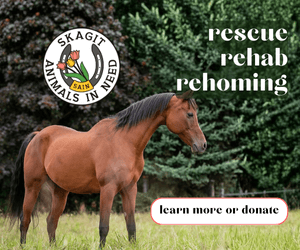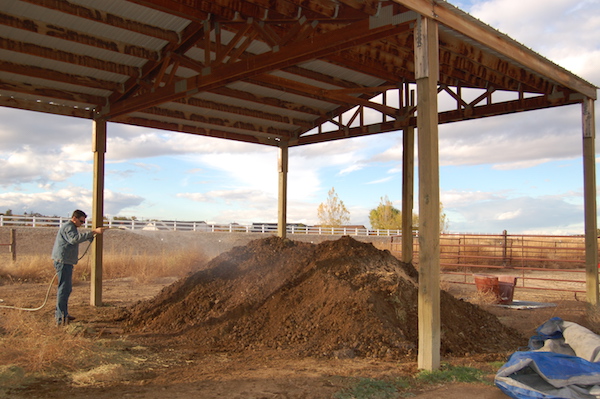6 Steps to a Useful Product
by Alayne Blickle
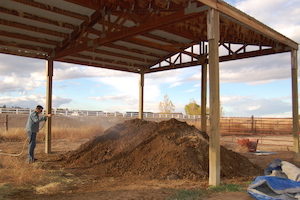
In the past we have covered why composting manure is important and useful on horse properties. I have even discussed how to build a manure composting bin system. Here are the specifics on how to manage the compost process.
- Make a pile. Begin by piling the daily manure and stall waste in one pile. Before that pile is so big that you can’t manage it (but at least as big as a washing machine), leave it and start building a second pile. Repeat this for a third and final pile. In two to six months the first pile should be done composting and you can start using the compost from that pile.
- Cover your piles. This can be done with a tarp, plastic sheet, or a roof. A cover of some sort will prevent your piles from becoming a soggy mess in the winter and too dried out in the summer. Covering them also prevents the nutrients you’re saving for the garden from being washed out into the surface water and causing other problems.
- Aeration. Turning the compost-to-be allows oxygen to get to the bacteria and organisms that break down the material into dirt-like structures. This keeps the process aerobic, an “earthy” smelling process. If the compost becomes anaerobic—without air—it will have a foul, undesirable odor. How often you turn it determines how quickly your compost will be ready.
However, unless you have access to a small tractor or enjoy a good workout, turning the pile can be difficult. Air will permeate through the pile to a depth of about two feet. An easy way to get air to the center and avoid turning the pile as frequently is to insert a couple of five-foot PVC pipes into the center of the pile. Use a drill to put holes along pipes. The pile will still need to be turned occasionally to get the manure on the outside into the center so the heat from the composting process can kill parasites and weeds.
-
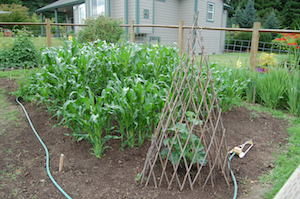
Compost is useful in your garden. Photo courtesy Alayne Blickle Water. Your compost material should be about as damp as a wrung-out sponge. In the summer water your compost with a garden hose when you turn it. Another easy way to add water is just to hose down the manure and stall waste in your wheelbarrow before you dump into the pile.
- Finished compost. If you follow these guidelines your compost could be ready as quickly as one month. Realistically, depending how often you turn it and whether it stays damp, it will probably take between three to four months to finish. In the winter when microbes are less active, it may take more like six months. You will know when your compost is ready when the material looks evenly textured and crumbly like dirt and no longer like the original material.
- Uses for compost. Compost is a rich soil enhancement that improves the health of both plants and soil and helps to retain moisture. Spread compost in pastures during the growing season in thin layers, no more than a ½ inch thick, three to four times per season. It can be also added to the soil of houseplants, gardens, lawns, or flowerbeds — or shared with horseless neighbors.
Join Alayne Blickle at these FREE upcoming Horses for Clean Water events:
NAMPA, ID
Sweet Pepper Ranch
Sunday, October 8, 1:00 – 3:00 p.m.
WORKSHOP & FARM WALK: Designing Mud-free Horse Paddocks & Managing Winter Pasture
$10/person or $20/household Register: [email protected]
REDMOND, WA
Two Horse Ranch
Sunday, October 29, 1:00 – 3:00 p.m.
FARM TOUR: Horses and Salmon
Register at 425-282-1949 or [email protected] or kingcd.eventbrite.com
KING COUNTY, WA
Thursdays, October 19, 26, and November 2, 9, 6:15 p.m. to 9:00 p.m.
WORKSHOPS: Land & Water Stewardship for Livestock & Small Farm Owners
Register: kingcd.eventbrite.com, (425) 282-1949 or [email protected]
WOODINVILLE, WA
Meadow Ridge Farm
Saturday, November 4, 10:00 a.m. – 12:00 p.m.
FARM TOUR: Get Ready for Winter at the Mud-free Horse Property
Register at 425-282-1949 or [email protected] or kingcd.eventbrite.com
Originally Published September 2017 Issue
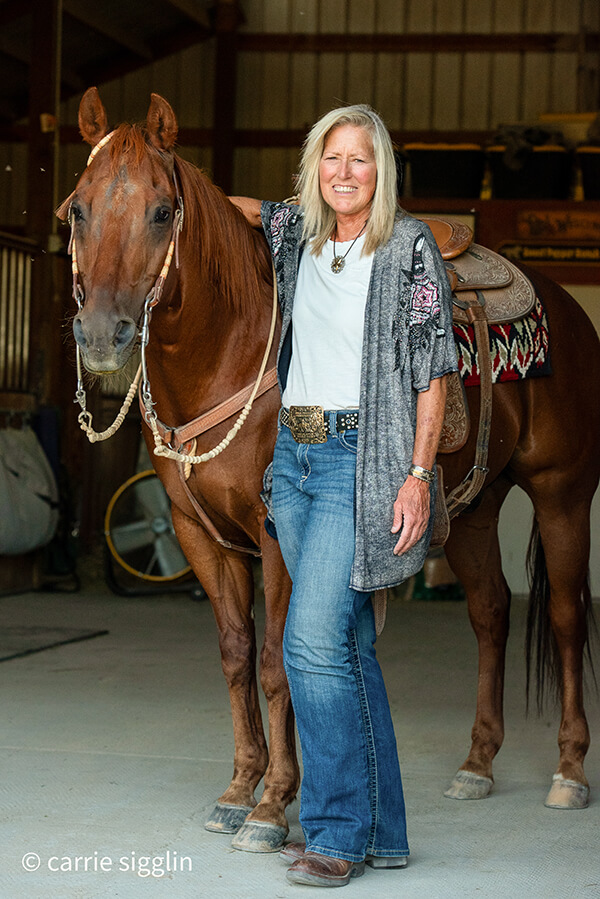
Alayne Blickle began in the 1990’s as a pioneer in water conservation and natural resources conservation by creating the entrepreneurial consulting business, Horses for Clean Water, an award-winning internationally acclaimed education program that looks for horse-healthy, nature-based solutions to land management challenges. She continues this work today partnering with agencies, organizations, and horse owners throughout North America and worldwide. She is a regularly contributing writer and photojournalist to several equine publications.
Alayne lives with her horse trainer husband, Matt Livengood, in southwestern Idaho where they raise and train AQHA horses and mustangs on their eco-friendly horse ranch. Contact her through the Horses for Clean Water website or through their ranch website Sweet Pepper Ranch.
For more information contact Alayne at [email protected] or 206-909-0225.




